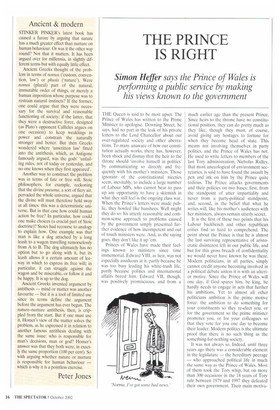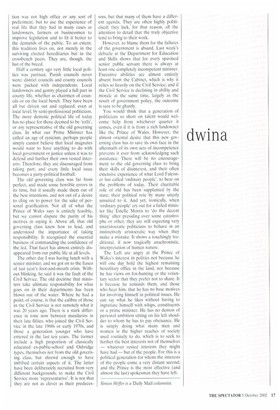THE PRINCE IS RIGHT
Simon Heifer says the Prince of Wales is
performing a public service by making his views known to the government
THE Queen is said to be most upset. The Prince of Wales has written to the Prime Minister to apologise. Downing Street, he says, had no part in the leak of his private letters to the Lord Chancellor about our over-regulated society and other aberrations. To many unaware of how our constitution actually works, there has, however, been shock and dismay that the heir to the throne should 'involve himself in politics' by communicating so directly and frequently with his mother's ministers. Those ignorant of the constitutional niceties seem, inevitably, to include a large number of Labour MPs, who cannot bear to pass up any opportunity to have a skirmish in what they still feel is the ongoing class war. When the Prince's letters were made public, they howled like banshees. Well might they do so: his utterly reasonable and common-sense approach to problems caused by the government simply presented further evidence of how incompetent and out of touch ministers were. And, as the saying goes, they don't like it up 'em.
Princes of Wales have made their feelings known to ministers since time immemorial. Edward VIII, as heir, was not especially assiduous at it, partly because he was too busy leading his white-trash life, partly because politics and international affairs bored him. Edward VII, though, was positively promiscuous, and from a much earlier age than the present Prince. Since heirs to the throne have no constitutional position, they can do pretty much as they like, though they must, of course, avoid giving any hostages to fortune for when they become head of state. This means not involving themselves in party politics, and the Prince of Wales has not. He used to write letters to members of the last Tory administration; Nicholas Ridley, that most unecological of environment secretaries, is said to have found the assault by pen and ink on him by the Prince quite tedious. The Prince attacks governments and their policies on two bases: first, from the standpoint of utter impartiality and never from a party-political standpoint, and, second, in the belief that what he writes will, like his mother's audiences with her ministers, always remain utterly secret.
It is the first of these two points that his Labour backbench and other republican critics find so hard to comprehend. The point about the Prince is that he is almost the last surviving representative of aristocratic disinterest left in our public life, and but for this gross breach of confidentiality we would never have known he was there. Modern politicians, in all parties, simply cannot credit anyone becoming involved in a political debate unless it is with an ulterior motive. Since the Prince of Wales will one day, if God spares him, be king, he hardly needs to engage in acts that further his ambitions. Yet to almost all other politicians ambition is the prime motive force: the ambition to do something for your constituents so they re-elect you, or for the government so the prime minister promotes you, or for your colleagues so that they vote for you one day to become their leader. Modern politics is the ultimate proof that there is no such thing as the something-for-nothing society.
It was not always so. Indeed, until three years ago there was a considerable element in the legislature — the hereditary peerage — who approached political life in much the same way as the Prince of Wales. Most of them took the Tory whip, but on more than 300 occasions in the 18 years of Tory rule between 1979 and 1997 they defeated their own government. Their main motiva tion was not high office or any sort of preferment, but to use the experience of real life that they had in many cases as landowners, farmers or businessmen to improve legislation and to fit it better to the demands of the public. To an extent, this tradition lives on, not merely in the surviving elected hereditaries but in the crossbench peers. They are, though, the last of the breed.
Half a century ago very little local politics was partisan. Parish councils never were; district councils and county councils were packed with independents. Local landowners and gentry played a full part in county life, whether as chairmen of councils or on the local bench. They have been all but driven out and replaced, even at local level, by semi-professional politicians. The more demotic political life of today has no place for those deemed to be 'toffs', or any representative of the old governing class. In what our Prime Minister has called an age of cynicism, perhaps people simply cannot believe that local magnates would want to have anything to do with local government or justice unless it was to defend and further their own vested interests. Therefore, they are discouraged from taking part, and every little local issue becomes a party-political football.
The old governing class was far from perfect, and made some horrible errors in its time, but it usually made them out of the best intentions, and not out of a desire to cling on to power for the sake of personal gratification. Not all of what the Prince of Wales says is entirely feasible, but we cannot dispute the purity of his motives in saying it. Above all, that old governing class knew how to lead, and understood the importance of taking responsibility. It recognised the essential business of commanding the confidence of the led. That facet has almost entirely disappeared from our public life at all levels.
The other day I was having lunch with a senior minister, and we got on to the fiasco of last year's foot-and-mouth crisis. Without blinking, he said it was the fault of the Civil Service. The old doctrine that ministers take ultimate responsibility for what goes on in their departments has been blown out of the water. Where he had a point, of course, is that the calibre of those in the Civil Service is not remotely what it was 20 years ago. There is a stark difference in tone now between mandarins in their late fifties, who joined the Civil Service in the late 1960s or early 1970s, and those a generation younger who have entered in the last ten years. The former include a high proportion of classically educated ex-public-school and Oxbridge types, themselves not from the old governing class, but shrewd enough to have imbibed certain aspects of it. The latter have been deliberately recruited from very different backgrounds, to make the Civil Service more 'representative'. It is not that they are not as clever as their predeces sors, but that many of them have a different agenda. They are often highly politicised; they lack, for that reason, all the attention to detail that the truly objective tend to bring to their work.
However, to blame them for the failures of the government is absurd. Last week's debacle at the Department for Education and Skills shows that for every spavined senior public servant there is always at least one completely incompetent minister. Executive abilities are almost entirely absent from the Cabinet, which is why it relies so heavily on the Civil Service; and if the Civil Service is declining in ability and morale at the same time, largely as the result of government policy, the outcome is sure to be ghastly.
You would think that a generation of politicians so short on talent would welcome help from whichever quarter it comes, even if it is from a rich landowner like the Prince of Wales. However, the almost oriental desire that this new governing class has to save its own face in the aftermath of its own acts of incompetence prevents it ever from acknowledging such assistance. There will be no encouragement to the old governing class to bring their skills of disinterest, and their often extensive experience of what Lord Falconer has called 'ordinary people', to bear on the problems of today. Their charitable role of old has been supplanted by the state; their political role by many utterly unsuited to it. And yet, ironically, when 'ordinary people' cry out for a failed minister like Estelle Morris to 'do the decent thing' after presiding over some catastrophe or other, they are still expecting very unaristocratic politicians to behave in an instinctively aristocratic way when they make a mistake. It shows a touchingly traditional, if now tragically anachronistic, interpretation of human nature.
The Left are angry at the Prince of Wales's interest in politics not because he will one day hold the highest remaining hereditary office in the land, nor because he has views on fox-hunting or the voluntary sector that they prefer not to share. It is because he reminds them, and those who hear him, that he has no base motives for involving himself in political issues. He can say what he likes without having to ingratiate himself with whips, constituents or a prime minister. He has no demon of personal ambition sitting on his left shoul der to whom he has to pay obeisance. He is simply doing what many men and women in the higher reaches of society used routinely to do, which is to seek to further the best interests not of themselves — whatever vested interests they might have had — but of the people. For this is a political generation for whom the interests of the people come a very distant second; and the Prince is the most effective (and almost the last) spokesman they have left.
Simon Heifer is a Daily Mail columnist.





































































 Previous page
Previous page